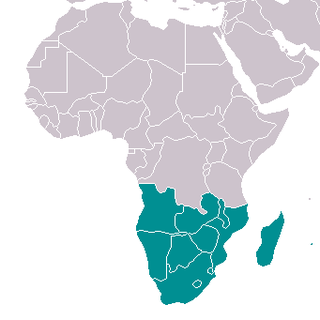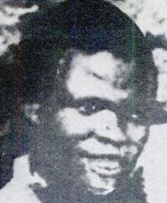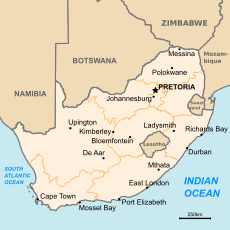The Sharpeville Six were six South African protesters convicted of the murder of Deputy Mayor of Sharpeville, Kuzwayo Jacob Dlamini, and sentenced to death.

United Nations Security Council Resolution 1672, adopted on April 25, 2006, after recalling resolutions 1556 (2004), 1591 (2005), 1651 (2005) and 1665 (2006) on the situation in Sudan, the Council imposed travel and financial sanctions on four Sudanese individuals over their involvement in the Darfur conflict. It was the first time sanctions had been adopted against individuals in the region.

United Nations Security Council Resolution 181, adopted on August 7, 1963, was concerned with an arms build-up by the Republic of South Africa and fears that those arms might be used to further the racial conflict in that country. The Council called upon the government of South Africa to abandon its policy of apartheid, as first requested to by Resolution 134 (1960), and called upon all states to voluntarily cease the sale and shipment of all arms, ammunition and other military equipment to South Africa.

United Nations Security Council Resolution 190, adopted on June 9, 1964, after reiterating its previous requests of the Republic of South Africa, the Council noted with great concern the Rivonia Trial and urged the government to release all persons convicted or being tried for their opposition to apartheid. The Council also invited all states to exert all their influence in order to induce the Government of South Africa to comply and asked the Secretary-General to closely follow the implementation of the present resolution to report on it to the Security Council at the earliest possible date.

United Nations Security Council Resolution 191, adopted on June 18, 1964, after reiterating its previous requests of the Republic of South Africa and again condemning apartheid, the Council decided to establish a Group of Experts made up of representatives of all the then current members of the Council to study the feasibility and effectiveness of measures which could be taken by the Council under the Charter. The Council also invited the Secretary-General to establish education and training programs for South Africans abroad.

United Nations Security Council Resolution 282, adopted on July 23, 1970, concerned by violations of the arms embargo passed against South Africa in Resolution 181, the Council reiterated its total opposition to the policies of apartheid and reaffirmed its previous resolutions on the topic. The Council called upon states to strengthen the arms embargo by ceasing the provision of military training to members of the South African armed forces and by taking appropriate action to give effective to the resolution's measures.

United Nations Security Council resolution 591, adopted unanimously on 28 November 1986, after recalling resolutions 418 (1977), 421 (1977), 473 (1980) and 558 (1984), the Council strengthened the mandatory arms embargo against apartheid South Africa imposed by Resolution 418, and made it more comprehensive. Resolution 591 sought to clarify vague terms from previous resolutions on the topic.

United Nations Security Council Resolution 393, adopted on July 30, 1976, after a letter from a representative from Zambia, the Council condemned a recent attack by South Africa in Zambian territory, resulting in the destruction of property and loss of life. The resolution went on to express concern at South Africa's occupation and use of South West Africa as a base for attacking neighbouring African countries, and that the continuation of this would constitute a threat to international peace and security.

United Nations Security Council resolution 503, adopted unanimously on 9 April 1982, after reaffirming Resolution 473 (1980), the Council expressed its concern at the death sentences issued by the Transvaal Provincial Division of the Supreme Court of South Africa against Ncimbithi Johnson Lubisi, Petrus Tsepo Mashigo and Naphtali Manana, all of whom were members of the African National Congress.

United Nations Security Council resolution 547, adopted unanimously on 13 January 1984, after reaffirming previous resolutions on the topic, the Council expressed its concern at the death sentences issued to Malesela Benjamin Maloise, a member of the African National Congress.

United Nations Security Council resolution 566, adopted on 19 June 1985, after recalling resolutions 269 (1969), 276 (1970), 301 (1971), 385 (1976), 431 (1978), 432 (1978), 435 (1978), 439 (1978), 532 (1983) and 539 (1983), the Council expressed concern at the tension and instability caused the continued occupation of Namibia by South Africa, noting the apartheid policies implemented in the territory and that the territory was used as a springboard for attacks on other southern African countries.

United Nations Security Council resolution 568, adopted unanimously on 21 June 1985, after hearing representations from Botswana, the Council condemned the Raid on Gaborone by South Africa, expressing its shock and indignation at the loss of life and damage to property and considered the attack as a "gross violation of the country's sovereignty and territorial integrity".

United Nations Security Council resolution 568, adopted on 26 July 1985, after expressing its outrage and concern at the suffering caused by the apartheid system in South Africa, the Council further condemned the repressive policies of the apartheid system including murders and forced removals, as well as the state of emergency imposed in 36 districts in the country, demanding it be lifted immediately.

United Nations Security Council resolution 581, adopted on 13 February 1986, after hearing representations from Sudan and the front-line states and reaffirming resolutions 567 (1985), 568 (1985), 571 (1985), 572 (1985) and 580 (1985), the Council strongly condemned "racist South Africa" for its recent threats to perpetrate acts of aggression against neighbouring countries in southern Africa.

United Nations Security Council resolution 601, adopted on 30 October 1987, after recalling resolutions 269 (1969), 276 (1970), 301 (1971), 385 (1976), 431 (1978), 432 (1978), 435 (1978), 439 (1978), 532 (1983), 539 (1983) and 566 (1985), the council again condemned South Africa for its continued "illegal" occupation of Namibia and its refusal to comply with previous resolutions.

United Nations Security Council resolution 606 was adopted unanimously on 23 December 1987, after recalling Resolution 602 (1987) and noting the Secretary-General's report authorised by that resolution. The Council condemned South Africa for its continued occupation of southern parts of the People's Republic of Angola and for its delay in withdrawing its forces from the area.

United Nations Security Council resolution 610, adopted unanimously on 16 March 1988, after reaffirming resolutions 503 (1982), 525 (1982), 533 (1983) and 547 (1984) expressing concern at the imposed death sentences of anti-apartheid activists, the Council noted the deteriorating situation in South Africa. Resolution 610 concerned the Sharpeville Six, accused of the murder of the Deputy Mayor of Sharpeville on 12 December 1985.

In United Nations Security Council resolution 615, adopted unanimously on 17 June 1988, after reaffirming resolutions 503 (1982), 525 (1982), 533 (1983), 547 (1984) and 610 (1988) expressing concern at the imposed death sentences of anti-apartheid activists, the Council noted the deteriorating situation in South Africa.

United Nations Security Council resolution 919, adopted unanimously on 25 May 1994, after recalling all resolutions on South Africa, in particular resolutions 282 (1970), 418 (1977), 421 (1977), 558 (1984) and 591 (1986), the Council welcomed the recent general elections and new government and decided, under Chapter VII of the United Nations Charter, to terminate the arms embargo and all other restrictions against South Africa.

Malesela Benjamin Moloise was a South African poet and political activist who came to international attention following his arrest and subsequent execution by the government of South Africa. From Soweto, Moloise worked as an upholsterer before turning to poetry during his time on death row. In 1983, Moloise was arrested for the 1982 murder of Phillipus Selepe, a black security policeman who assisted in capturing three African National Congress (ANC) members. Although he initially confessed to the murder, he later retracted the statement during his trial. Moloise's death sentence sparked national and international outrage and was seen as emblematic of South Africa's brutal crackdown on anti-apartheid activists.










